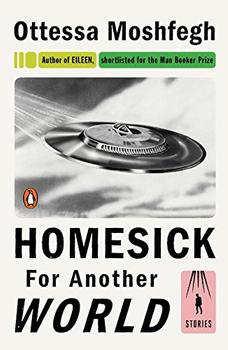Summary | Excerpt | Reviews | Beyond the Book | Read-Alikes | Genres & Themes | Author Bio

Critics' Opinion:
Readers' Opinion:
First Published:
Jan 2017, 304 pages
Paperback:
Dec 2017, 304 pages
 Book Reviewed by:
Book Reviewed by:
Barbara Bamberger Scott
Buy This Book
This article relates to Homesick for Another World
In the story "No Place for Good People," one of the short stories in Homesick for Another World by Otessa Moshfegh, a lonely widower takes a job overseeing the daily needs of three men with "moderate developmental disabilities." Despite his personal problems, the protagonist is able to see these men as "reasonable enough people." This attitude reflects a relatively recent, open-minded, respectful view of those who used to be clinically labeled feeble-minded, morons, or idiots.
Before the middle of the 20th century, most Americans had little or no contact with the disabled unless through family. In general, the greatest level of care offered by society was to the blind, and though such care was often paternalistic, there was at least a sense that blind people could be contributors to society. There were resources for the deaf and speech-impaired, but fewer. Those who had low IQ and unusual physical features, such as people with Down Syndrome, used to be termed Mongoloid Idiots. Medicinenet offers this information: "Down Syndrome refers to the 19th century English physician J. Langdon Down who described the condition in 1866. In great error, Langdon Down attributed the condition to a 'reversion' to the 'mongoloid race.' He held that evolution had been reversed and there had been a sort of backslide from the superior Caucasian to the inferior Oriental race. The misnomer 'mongolism' is incorrect and racist and is to be avoided."
These deficits in our social structures reflected an atavistic fear of differentness. Even the families of such afflicted people would be stigmatized. Churches and charities offered some help, and some disabled people resorted to begging. In any case, they were objects of suspicion, cruelty or pity. Their lifespans were often short; take for example, the aforementioned people with Down Syndrome: according to the National Down Syndrome Society, in the past 15 years, with increased treatment options, school and other interventional modalities, the average lifespan of a Down Syndrome person has increased from 25 to 49 years.
My own experience of intellectually disabled persons began with my younger brother who, in 1960 at the age of four, was diagnosed with "profound" autism; the medical advice given to my parents was to institutionalize him for life and "forget him." They did not take this advice and my brother, who in the 1990s was correctly diagnosed with Asperger Syndrome, had a productive life, earning a BA from the University of North Carolina and later a Master's Degree in Psychology. My personal interest in people with such disabilities led me to become a community college instructor and case manager for intellectually disabled people from 1998 to 2008.
One great breakthrough for the intellectually and physically handicapped was the presidency of John F. Kennedy, who had a mentally disabled sister. Kennedy established a Presidential Panel that asserted that "mental retardation" (the proper medically accepted terminology at the time) is preventable and can be ameliorated. The Civil Rights Act of 1964 gave rights to many minority groups including disabled persons. These were greatly expanded and redefined with the passage in 1990, of the the American with Disabilities Act, mandating full inclusion and integration for persons with developmental disabilities. The Act mandates that the disabled be accommodated in many areas including employment, public transportation, and public and commercial facilities such as restrooms.
Since the 1960s, there have been gradual but highly significant changes in American society with respect to the resources and opportunities afforded to people with disabilities. There have been advancements in medical, psychological and social attention and treatment. Group homes and work programs have made it possible for adults to have safe, respectable lives, with care appropriate to their needs. Their education is no longer called "compensatory," since now, 27 years post-ADA, disabled youth in the United States have legal access to education K-12 and beyond.
The ADA has been highly effective in allowing disabled people (such as the three men in Moshfegh's story) to become visible and functional citizens, coworkers and friends in our schools, workplaces, and communities.
In 2010 the pejorative and prejudicial term "mental retardation," used in Moshfegh's story, was officially replaced with the term "intellectually disabled" (which also features in the book) through legislation signed by President Barack Obama known as Rosa's Law.
Filed under Society and Politics
![]() This "beyond the book article" relates to Homesick for Another World. It originally ran in January 2017 and has been updated for the
December 2017 paperback edition.
Go to magazine.
This "beyond the book article" relates to Homesick for Another World. It originally ran in January 2017 and has been updated for the
December 2017 paperback edition.
Go to magazine.





The Flower Sisters
by Michelle Collins Anderson
From the new Fannie Flagg of the Ozarks, a richly-woven story of family, forgiveness, and reinvention.

The House on Biscayne Bay
by Chanel Cleeton
As death stalks a gothic mansion in Miami, the lives of two women intertwine as the past and present collide.

The Funeral Cryer by Wenyan Lu
Debut novelist Wenyan Lu brings us this witty yet profound story about one woman's midlife reawakening in contemporary rural China.
Your guide toexceptional books
BookBrowse seeks out and recommends the best in contemporary fiction and nonfiction—books that not only engage and entertain but also deepen our understanding of ourselves and the world around us.